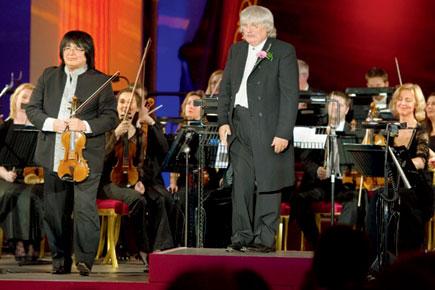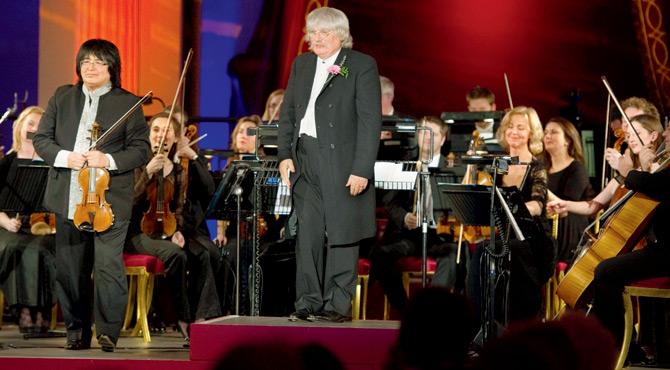The most performed living composer in the world, Sir Karl Jenkins, will premiere his new piece in Mumbai


Sir Karl Jenkins (centre) with violin virtuoso Marat Bisengaliev at a concert. The two will perform together again. Pic/getty images
ADVERTISEMENT
It's that time of the year when internationally renowned artistes come down to Mumbai with a musical treat for the city. At the ongoing autumn season of the Symphony Orchestra of India (SOI), music aficionados are in not only for renditions of classical compositions by Beethoven, Mozart, Dvorak, Tchaikovsky and Verdi, but will also be the first audience members in the world to hear acclaimed Welsh composer Sir Karl Jenkins perform his latest piece, Alem the Universe, live.
We spoke to Sir Jenkins over a phone call from London, ahead of his visit to India.
Edited excerpts from the interview:
Tell us about your new composition...
Alem the Universe [Alem means the universe in Kazakh] was commissioned by [SOI music director] Marat Bisengaliev and his Almaty Symphony Orchestra for Expo 2017 in Astana, Kazakhstan. Baikonur Cosmodrome in southern Kazakhstan is the world's first and largest space launch facility.
The work is a personal reflection of how I perceive the universe to be, since only 12 people have ever set foot on terra firma in space — on the moon; and that too, each one only once. The work begins with 'Big Bang'. After a few seconds, we move into 'Infinitum', a movement expressing the infinity of space, a concept I think we all have difficulty in imagining. 'Shooting Stars' appears [Infinitum and Shooting Stars are played continuously] making us realise that space is alive in its movements and gestures, even if no life exists.
Your oeuvre spans classical compositions to jazz to advertising music. How have the genres informed one another?
I compose with an open mind and I am against boxing music into categories. My work in advertising exposed me to ethnic music from a variety of cultures, so it is natural for those influences to find their way into my music. My work, The Peacemakers, for instance, features texts of Gandhi, Martin Luther King, the Dalai Lama, Nelson Mandela, Anne Frank and Mother Teresa. The part with Gandhi's words is accompanied by the bansuri and tabla.
Your 1999 piece, The Armed Man: A Mass For Peace, which made you the most performed living composer, was dedicated to the victims of the Kosovo crisis. How do you view your composition in today's times?
The world is still ravaged by violence and discrimination. Today, the piece can be dedicated to those in Syria and other victims of ISIS. That it has been performed over 2,000 times means it is unfortunately still relevant.
 Subscribe today by clicking the link and stay updated with the latest news!" Click here!
Subscribe today by clicking the link and stay updated with the latest news!" Click here!






